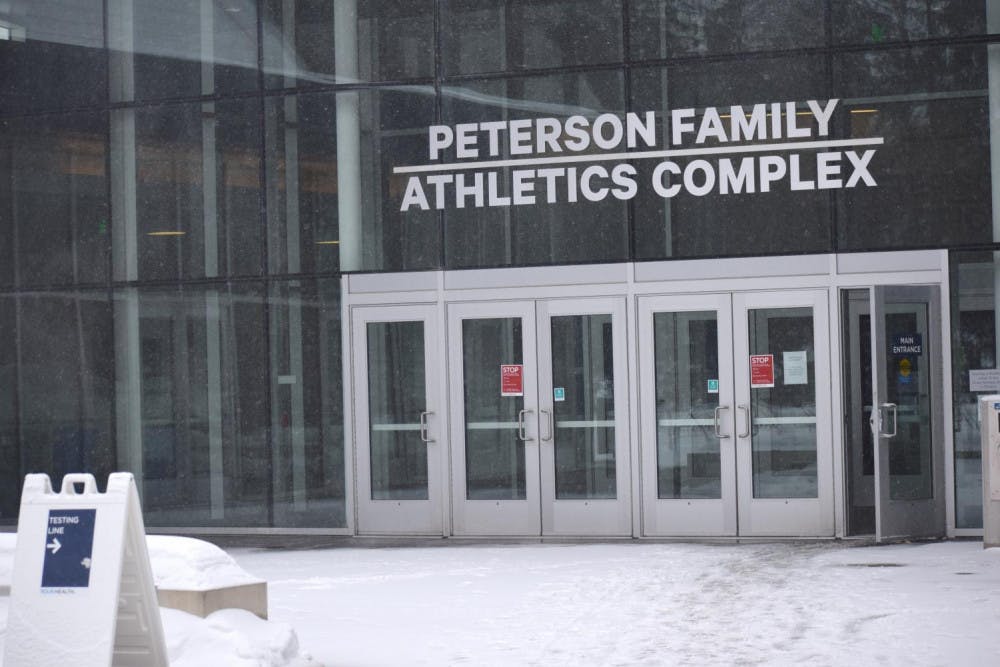One student tested positive for Covid-19 out of 1,932 tests conducted during Sunday and Monday’s Day Zero arrival testing, according to an email from the college. The student is currently in isolation and contact tracing has been completed. The college also reported a combined total of 30 tests that came back inconclusive or were cases of insufficient samples.
“Inconclusive” results have a different meaning this spring due to the adoption of a two-probe method for testing samples at the Broad Institute. The new method tests for the presence of two viral gene targets.
A sample is positive if both probes identify viral material. But if only one probe detects the virus, students will receive an “inconclusive” result, according to Chief Health Officer and College Physician Mark Peluso.
Students will need to quarantine until they receive a negative result, and those who live with a roommate will be temporarily relocated.
“What they’ve found is, when there’s viral material on only one probe, it doesn’t mean that there’s infection. However, when they’ve done subsequent testing soon thereafter, a fair number of those people test positive,” Peluso said in a Feb. 17 staff and faculty webinar.
Peluso explained that they are now wondering if the appearance of viral material on only one of the two probes is an indication of an early positive, though they are not yet sure if this is the case.
Students may now also receive an “invalid” or an “unsatisfactory” result — new classifications previously falling under the umbrella category of “inconclusive” — and will also need to retest.
The college has upped the number of arrival tests, including midweek testing in addition to the Day Zero and Day Seven testing that on-campus students completed last fall. Dean of Students Derek Doucet said the college is conducting additional testing because of high Covid-19 prevalence in the U.S.
Though new daily cases in the U.S. are in decline, they are still above those reported in August when students were returning to campus. New daily cases in Vermont ranged from the single digits to the teens in August but are now much higher — with a daily average of 111 new cases in the last seven days. Addison county has reported 73 new cases in the past 14 days.
Covid-19 variants are another concern as students return to on-campus life. The B.1.1.7 variant, which spreads more easily and rapidly than other variants, was found in Burlington’s wastewater earlier this month.
Even so, the number of positive students has so far remained lower than the previous semester, when only two students tested positive upon arrival. No other on-campus students received positive results throughout fall targeted dynamic testing, and three positives were discovered during optional pre-departure testing.
“These early results are encouraging and reflect the incredible effort of our students in preparing to return to campus. Still, with a higher prevalence of Covid-19 nationwide, including at colleges in Vermont, this is no time to let down our guard,” Peluso said in an email update today.
The college is not conducting arrival testing for students who have tested positive for the virus within a 90-day window. Students who are fully vaccinated against Covid-19 were still tested.
News Editor Sophia McDermott-Hughes contributed reporting.

Abigail Chang ’23 (she/her) is the Editor in Chief.
She previously served as a managing editor, Senior News Editor, News Editor and co-host of The Campus' weekly news radio show.
Chang is majoring in English and minoring in linguistics. She is a member of the Media Portrayals of Minorities Project, a Middlebury lab that uses computer-assisted and human coding techniques to analyze bulk newspaper data.
Throughout last year, Chang worked on source diversity and content audits for different media properties as an intern for Impact Architects LLC. Chang spent summer 2021 in Vermont, working as a general assignment reporter for statewide digital newspaper VTDigger. Chang is also a member of the Middlebury Paradiddles, an a cappella group.




